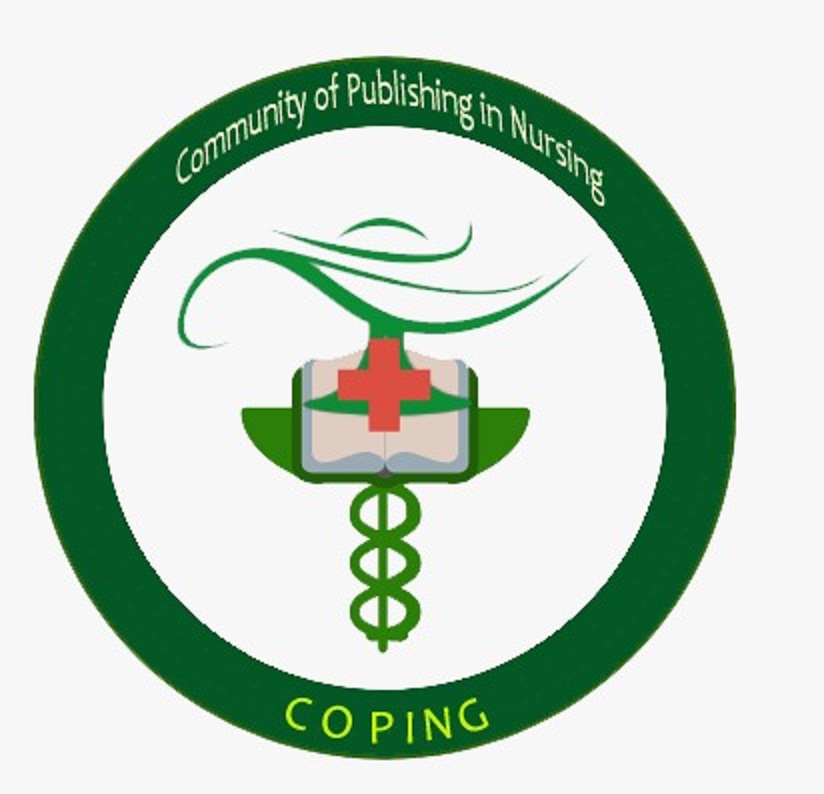GAMBARAN PERAN STRUKTURAL KELUARGA PADA REMAJA SELAMA MASA PANDEMI COVID-19
Abstract
Perkembangan psikososial remaja di masa pandemi COVID-19 menjadi terganggu. Pembatasan interaksi sosial akibat lock down berdampak pada tugas perkembangan remaja, yang dominan berlangsung hanya di lingkungan keluarga. Tujuan penelitian ini adalah untuk mengetahui gambaran peran keluarga secara struktural pada kesejahteraan remaja. Penelitian ini menggunakan metode deskriptif observatif. Pengambilan sampel dilakukan secara screened sampling. Hasil penelitian menunjukkan 82,2% tingkat pengaruh faktor internal peran keluarga pada penelitian ini bersifat sedang, menggambarkan terkait kondisi keluarga, berupa komposisi keluarga, adanya pengaruh jenis kelamin terhadap keyakinan dan peran perawatan, elemen eksternal tinggi sebesar 54,3% menggambarkan tentang adanya pengaruh keluarga besar, dan kontak sosial keluarga, dengan lingkungan; dan faktor kontekstual keluarga pada penelitian ini bersifat sedang (59,7%) yang menggambarkan terkait etnisitas, pengaruh budaya, kelas sosial, agama dan kepercayaan. Peraturan lock down pada masa pandemi membuat remaja lebih banyak menghabiskan waktu di rumah dibandingkan bersosialisasi dengan teman sebaya. Dukungan dan peran keluarga berperan penting pada kesehatan dan tugas perkembangan keluarga selama menjalani masa pandemi COVID-19.
Downloads
References
Asmundson, G., & Taylor, S. (2020). Coronaphobia Fear adn the 2019-nCov outbreak. Journal of Anxiey Disorders, 70(January), 3.
Bevilacqua, L., Shackleton, N., Hale, D., Allen, E., Bond, L., Christie, D., Elbourne, D., Fitzgerald-yau, N., Fletcher, A., Jones, R., Miners, A., Scott, S., Wiggins, M., Bonell, C., & Viner, R. M. (2017). The role of family and school-level factors in bullying and cyberbullying : a cross- sectional study. BMC Pediatrics, 17(160), 1–10. https://doi.org/10.1186/s12887-017-0907-8
Donker, M. H., Mastrotheodoros, S., & Branje, S. (2021). Supplemental Material for Development of Parent-Adolescent Relationships During the COVID-19 Pandemic: The Role of Stress and Coping. Developmental Psychology, 57(10), 1611–1622. https://doi.org/10.1037/dev0001212.supp
Flexa Souza, T. C., Lavareda Costa, C. M., & Nunes Carvalho, J. (2017). Calgary family assesment model applied in riverside context. Journal of Nursing UFPE / Revista de Enfermagem UFPE, 11(12), 4798–4804. https://ejournal.mahidol.ac.th/login?url=http://search.ebscohost.com/login.aspx?direct=true&db=ccm&AN=126592155&site=ehost-live
Gayatri, M. (2020). Does early childhood education matter during covid-19 pandemic: A narrative review. The 3nd International Conference on Technology, Education, and Social Science 2020 (The 3nd ICTESS 2020), 2020, 405–414. https://ejurnal.unisri.ac.id/index.php/proictss/article/view/5052/3772
Hager, E., Odetokun, I. A., Bolarinwa, O., Zainab, A., Okechukwu, O., & Al-Mustapha, A. I. (2020). Knowledge, attitude, and perceptions towards the 2019 Coronavirus Pandemic: A bi-national survey in Africa. PloS One, 15(7), e0236918. https://doi.org/10.1371/journal.pone.0236918
Herke, M., Knöchelmann, A., & Richter, M. (2020). Health and well-being of adolescents in different family structures in germany and the importance of family climate. International Journal of Environmental Research and Public Health, 17(18), 1–12. https://doi.org/10.3390/ijerph17186470
Janssen, L. H. C., Kullberg, M. L., Verkuil, B., van Zwieten, N., Wever, M. C. M., van Houtum, L. A. E. M., Wentholt, W. G. M., & Elzinga, B. M. (2020). Does the COVID-19 pandemic impact parents’ and adolescents’ well-being? An EMA-study on daily affect and parenting. PLoS ONE, 15(10 October), 1–21. https://doi.org/10.1371/journal.pone.0240962
Janssens, J. J., Achterhof, R., Lafit, G., Bamps, E., Hiekkaranta, A. P., Hermans, K. S. F. M., Lecei, A., Myin-germeys, I., Kirtley, O. J., & Leuven, K. U. (2021). The Impact of COVID-19 on Adolescents ’ Daily Lives : The Role of Parent – Child Relationship Quality. 31(3), 623–644. https://doi.org/10.1111/jora.12657
Kadiroğlu, T., Güdücü Tüfekci, F., & Kara, A. (2021). Determining the Religious Coping Styles of Adolescents in Turkey During COVID-19. Journal of Religion and Health, 60(5), 3406–3417. https://doi.org/10.1007/s10943-021-01410-7
Kim, B., Kim, D. H., Jang, S. Y., Shin, J., Lee, S. G., & Kim, T. H. (2022). Family economic hardship and adolescent mental health during the COVID-19 pandemic. Frontiers in Public Health, 10(8). https://doi.org/10.3389/fpubh.2022.904985
Peres De Oliveira, P., Nogueira Maia, L., De Souza Resende, M., Sousa Macedo, R., Rodrigues, A. B., & Freire De Aguiar, M. Í. (2015). Use of the Calgary Family Assessment Model in Structural, Developmental and Functional Assessment of the Family of Mastectomized Women With Breast Cancer Modelo Calgary Na Avaliaçãoestrutural, Desenvolvimental E Funcionalda Família De Mulheres Mastectomiz. Cogitare Enferm, 20(204), 661–669. http://docs.bvsalud.org/biblioref/2016/07/765/41527-165951-1-pb.pdf
Prabarini, L. P., Kumboyono, K., & Yuliatun, L. (2021). The Influence of Sociodemographic Factors on Community Knowledge, Perceptions, Attitudes, and Practices towards COVID-19 Prevention Protocols : A Scoping Review. Indian Journal of Forensic Medicine & Toxicology, 15(4), 1636–1644. https://doi.org/10.37506/ijfmt.v15i4.16941
Rogers, A. A., Ph, D., Ha, T., Ph, D., & Ockey, S. (2020). Since January 2020 Elsevier has created a COVID-19 resource centre with free information in English and Mandarin on the novel coronavirus COVID- 19 . The COVID-19 resource centre is hosted on Elsevier Connect , the company ’ s public news and information. January.
Schoeps, K., Tamarit, A., De la Barrera, U., Lacomba-Trejo, L., Montoya-Castilla, I., del Rosario, C., Coello, F., Herrera, S., Trujillo, Á., Riveros Munevar, F., & Amador Esparza, N. A. (2022). Social and Psychological Effects of COVID-19 Pandemic on Adolescents’ and Young Adults’ Mental Health: A Cross-Cultural Mediation Study. Psychological Reports, 0(0), 1–28. https://doi.org/10.1177/00332941221100451
Stanford Medicine. (2022). Teens: Relationship Development. Stanford University. https://www.stanfordchildrens.org/en/topic/default?id=relationship-development-90-P01642
Storey, A. M., Dirks, M., Holfeld, B., Dryburgh, N. S. J., & Craig, W. (2021). Family relationship quality during the COVID-19 pandemic: The value of adolescent perceptions of change. Journal of Adolescence, 93(June), 190–201. https://doi.org/10.1016/j.adolescence.2021.11.005
UNESCO. (2020). SOCIO-ECONOMIC AND CULTURAL IMPACTS OF COVID-19 ON AFRICA. United Nations Educational Scientific and Cultural Organization.
Yang, D., Hu, S., & Li, M. (2022). The Influence of Family Socioeconomic Status on Adolescents’ Mental Health in China. International Journal of Environmental Research and Public Health, 19(13). https://doi.org/10.3390/ijerph19137824
Zimansky, M., Stasielowicz, L., Franke, I., Remmers, H., Friedel, H., & Atzpodien, J. (2020). Effects of Implementing a Brief Family Nursing Intervention With Hospitalized Oncology Patients and Their Families in Germany: A Quasi-Experimental Study. Journal of Family Nursing, 26(4), 346–357. https://doi.org/10.1177/1074840720967022

This work is licensed under a Creative Commons Attribution-NonCommercial 4.0 International License.







